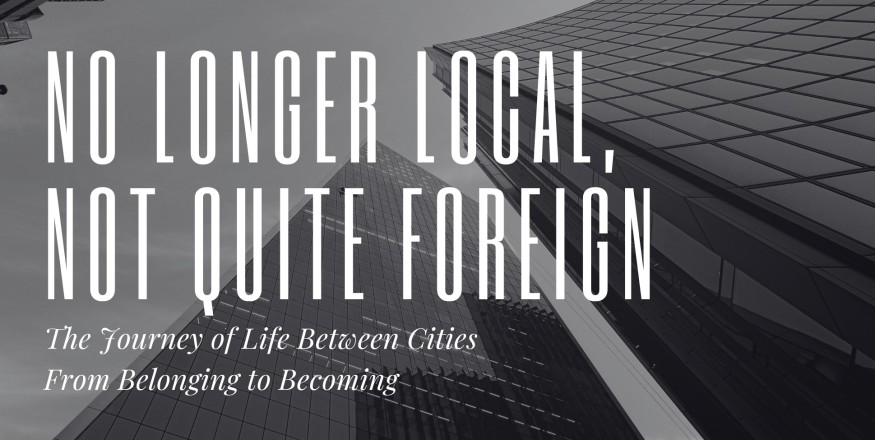In the heart of Central, hidden beneath the gilded eaves of The Landmark, there exists a place where time seems to fold upon itself. L'Atelier de Joël Robuchon, with its dark lacquered wood and crimson velvet, felt less like a restaurant and more like a quiet sanctuary. I remember it vividly: the hush of refined voices, the gleam of polished cutlery, the low murmur of French being exchanged between chefs behind the counter. It was sometime in 2009, and I was there with my father and my younger brother, Alex.
We had slipped away from the rest of the world for an afternoon—not for celebration, not even for any particular occasion, but simply to spend time together. It was a brief escape, a shared pause amid lives that were, even then, beginning to pull in different directions. My father had always been a man of precision and quiet dignity, and Alex, though still young, had inherited much of his calm. I was somewhere in between: old enough to appreciate, young enough to still observe from the edge.
The memory returns with the fragrance of freshly baked bread. The bread trolley was, and perhaps still is, the restaurant's most understated triumph. There was something almost ceremonial about the way it was wheeled to our table: a polished cart brimming with miniature baguettes, buttery brioches, crusty rolls, and flaky croissants, each one a story in its own right. We were told we could try as many as we wished. My brother's eyes lit up in that moment, and even my father, usually so composed, allowed himself a brief smile at the abundance.
We chose slowly, deliberately. I remember a tiny olive roll, warm to the touch, and a caramelised onion focaccia that left the faintest sweetness on the tongue. Butter was served in perfect curls on chilled silver. There was no pretence here, only perfection. I can still recall the way the bread broke in my fingers—a satisfying crackle that gave way to soft warmth. We didn’t speak much then, but we didn’t need to. These were the sorts of moments that sat quietly between us, unspoken but understood.
The meal itself felt like a masterclass in restraint. The amuse-bouche arrived in a glass, a layered symphony of sea urchin, lobster jelly, and cauliflower cream. It was the sort of dish that could have overwhelmed, but didn’t. A lesson in humility, as all good food should be. There is something deeply moving in a dish that is confident enough not to dazzle, but instead to invite.
My father chose the lamb, tender and blushing pink, with jus that shimmered like lacquer. I had the langoustine ravioli, delicately wrapped and bathing in a truffle sauce that whispered, never shouted. Alex, still a boy then, ordered a roast chicken, but it came reimagined—golden, deboned, and served with a medley of vegetables so precisely cut they could have been arranged with tweezers. He asked, without irony, if all vegetables in France were cut like this. We laughed quietly.
Between courses, we spoke little. Not out of distance, but reverence. The space called for a kind of hushed appreciation, the kind one usually reserves for cathedrals or libraries. Yet there was no stiffness, no hauteur. The waiters, dressed in black, moved with quiet efficiency, offering suggestions, never prescriptions. One of them noticed Alex’s fascination with the dessert trolley and promised he could choose anything he liked later.
He did. A dark chocolate tart, its surface as smooth as obsidian, paired with a scoop of vanilla ice cream flecked with real bean. My father took coffee; I lingered with a tea that smelt faintly of orchids. There was something soothing in the stillness of that moment, as if we were all instinctively aware of its finiteness.
As we left, stepping back into the fluorescence and noise of the mall, I recall feeling that we had experienced something that would remain with us—untouched by time, unchanged by repetition. It was not merely a dinner, but a gentle reminder that even in the most polished corners of the world, humility can be served on a silver plate.
And always, the bread. That bread.
It was, and perhaps still is, the finest I have ever tasted.
Looking back now, I realise that what made that afternoon endure was not only the craft of Robuchon or the flawless food, but the stillness it gave us. In a life often hurried and crowded with noise, that quiet harmony between us—father, sons, brothers—was rare. We were not marvelling at opulence, but simply grateful for a moment that asked nothing more of us than to be present. I often think of that day, not because of the accolades or acclaim, but because it felt, in its own way, timeless.
We returned many times in the years that followed—almost every visit to Hong Kong included at least one meal there, sometimes two. And each visit brought with it the same quiet ritual: the bread, the calm, the slow unfolding of time.
The last time I dined there was in 2018. I remember it clearly, not because it stood apart, but because it did not. It carried the same grace, the same quiet dignity. At the time, I didn’t think of it as a final visit—perhaps it isn’t. But for now, it remains the most recent chapter of a tradition quietly paused—and I still miss it.
When I think of Robuchon, I do not think of extravagance or spectacle. I think of my father’s careful nod as he tasted the lamb. I think of Alex’s quiet delight as he chose his dessert. I think of the stillness we shared. And yes, I think of the bread—always, the bread.
It has become a piece of memory, gently sealed by time. Not gone, but held.
ns18.225.149.198da2





















